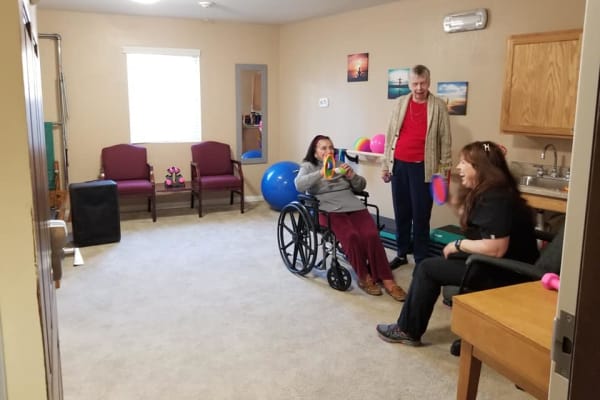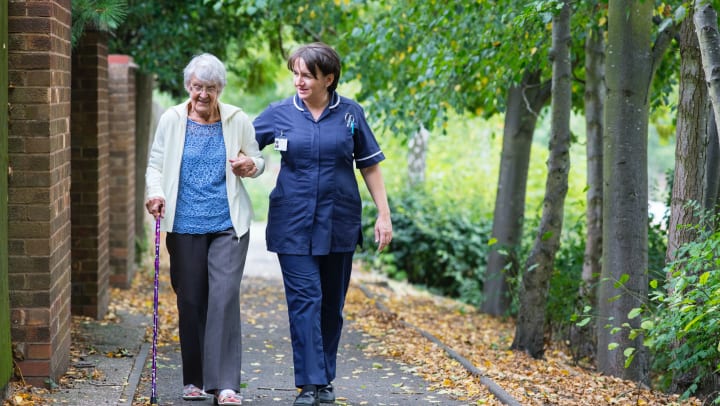Living with Alzheimer’s Disease or Dementia can oftentimes make even the most basic tasks difficult. At times the resident can have difficulty understanding instructions or can have difficulty with the necessary motor skills for the task. This can cause a resident to become frustrated, and even withdraw from their world. We know that keeping a resident active, both mentally and physically, can have important and visible results in their physical and mental health. We recently reviewed the best vitamins for seniors living with dementia, but let’s discuss some of the ways that a senior living with Alzheimer’s Disease can stay active!
Creative Activities for Dementia Patients
Activities, or hands on entertainment, can come in many forms: Creative, Reminiscing, Sensory, Physical. Let’s review some of the benefits of these activities.
Painting
Art Therapy is a fun, and incredibly creative way to spend time during a day. Many experts believe that art can help dementia patients express themselves. Bruce L. Miller, M.D., professor of neurology and director of the Memory and Aging Center at the University of California, San Francisco, has concluded from his research that creativity can still emerge in people with dementia, depending on where it most affects the brain. Creating art engages a different part of the brain than the part that we use for language. “We think that in patients with language loss, the visual side of their brain stops being inhibited by the verbal side and that allows their visual creativity to be released,” says Miller. “We have evidence now from functional imaging that it’s actually happening.”*
Knitting
Time and time again, we have come residents that have become less and less verbal, seemingly becoming uncommunicative with the outside of the world. But put them in front of a piano, or give them knitting or crochet needles, and their hands spring to life. It is almost as if their body remembers what the mind cannot. By understanding what a senior spent their time earlier in life, we can help their bodies “remember” those activities. Many communities have areas dedicated to these activities, whether it is a work bench, a piano, a knitting or sewing station, or even a full kitchen.
Floral Arrangements
Some activities can actually be a benefit to both the resident and the community. When a resident engages in the activity of flower arranging the benefit can be twofold. First, the resident gets to interact with nature with fresh flowers and greens, perhaps even from the community’s garden. Second, it promotes sensory stimulation, greater manual dexterity, and it even reduces stress. Floral arranging is also completely subjective, and can be completed by people of any age, ability, and skill. Finally the community is enhanced by the results of this activity, with fresh flowers in vases might be seen on the tables at every meal, or given as a welcome gift for new residents!
Reminiscing Activities for People with Dementia
Alzheimer’s Disease effects memory in many ways that are never completely understood. Short term memories can disappear but dates and events from early ages can be recalled distinctly. Instead of looking for specific memories, it is often easier to present certain memory triggers, that can link broader themes or items with memories from long ago. This is often referred to as reminiscing.
Looking at Photo Album
Sitting down with a resident or loved one, and paging through a photo album can often be a fulfilling way to spend an afternoon. Even though the resident may not remember the specific events captured in those photographs, they can remember the sights, the sounds, the feelings from those times. A resident can take great joy in seeing photographs of babies, of children, of weddings, and family events without truly remembering the specific time. Sometimes the resident is surprised and overjoyed at discovering that the young person smiling in that photograph is indeed them!
Old Movies, TV, or Music
Media leaves an indelible mark on a person. Whether it is the melody of a favorite song, the characters in a beloved television series, or the immersion into a cinematic piece, people remember how those pieces of entertainment make them feel. Specifically, music memory is believed to be spared in some forms of dementia. In some studies residents that have lost the ability to communicate verbally will suddenly begin singing along with a song they loved from their youth. Some residents can sit in front of a piano and begin playing for the first time in many years. Television also has an ability to almost transport a resident to a different time. Television series that a resident grew up watching can comfort them and bring back feelings of youth and joy, as if seeing familiar friends again.
Old Magazines
Walk through any antique shop, and you will discover old Time, Life, Sports Illustrated magazines for sale. As we look through these, we often compare them to current times. But put these magazines in front of someone with Alzheimer’s Disease, and you will often see a smile, and sometimes you’ll hear about memories of bygone time. Residents will comment on fashions that they used to wear. Residents will laugh about recipes they used to create from Good Housekeeping. Some residents will recall the events reported on in those magazines from world events to sports accomplishments. The pictures can transport them to a different time.
Sensory Stimulation Activities
Alzheimer’s Disease not only effects memory and cognitive ability, but it also typically effects the 5 senses: sight, smell, taste, hearing, and touch. The disease can obstruct these senses, confuse them, and sometimes heighten them. Let’s focus on when these senses are enhanced and the benefits that can come from engaging them.
Smells
Many studies have been completed and have found that the sense of smell is incredibly powerful in triggering memories in all people. This is based on the geography of the brain. The power of scent can bring about emotions as in the smell of a fresh spring rain. Scent can bring about memories and stimulate hunger such as the smell of fresh baked bread. Scent can also be used to calm and relax. Studies around aromatherapy have been fairly conclusive that they improve personal orientation related to cognitive function. The use of rosemary and lemon oils in the morning can help wake up and refresh a resident, while the scents of lavender and orange in the evening can help relax a resident and allow them to sleep easier.
Touch
Physical contact is essential for all people, but especially those living with Alzheimer’s Disease or dementia. It can start with something as small as a touch on the shoulder while speaking, or a hug in the morning. It has been shown in studies that residents that received a ten minute hand massage had significantly reduced agitation. Touch has shown to reduce feelings of insecurity, anxiety, and feelings of isolation. Though a resident may lose the ability to understand instructions or language, residents never lose the capacity to recognize caring touches.
Taste
As taste is so closely linked with the sense of smell, it makes sense that when someone with Alzheimer’s Disease or Dementia loses their sense of smell, that their sense of taste is also affected. That being said, food can still be an event, such as cooking demonstrations or tasting games. A cooking demonstration can involve the residents in the activity, they can taste the ingredients along the way, and can reminisce about when they cooked meals. Plus they get the added benefit of eating the fruits of their labor! Some tasting games can also be quite fun. Sampling different flavors of ice cream can often elicit positive and happy memories.
Physical Activities For Memory Care Residents
It is generally understood that regular physical activity benefits the brain. Researchers also believe that physical activity can help with dementia. Exercising regularly can help “improve memory, reasoning, judgement and thinking skills (cognitive function) for people with mild Alzheimer’s Disease”. Physical activity can take the form of actual physical exercise, or activity that utilizes motor skills.
Exercise
Exercise can take the form of whatever a resident is physically able to perform. Residents can be a part of a walking club, either inside or outside weather permitting. Communities may have access to some exercise equipment, or may just promote simple stretching exercises. Some residents need more chair based exercise which could include yoga, pilates, or even drumming. The important part isn’t what the resident is doing, it is important that they are doing it!
“Pitching In”
As strange as it might sound, “chores” are also a great activity. Now, these are not chores that you are assigned and might be grounded for not doing. No, these are activities that might bring about the memory of being a parent, or a caregiver. Some residents feel a sense of fulfillment when folding laundry, rolling socks, or helping set the tables. It gives them a sense of purpose, of having a part in the operation, and part of a normal routine.
Puzzles
Working out your mind is just as important as working out your body, and a great way to do that is by doing puzzles. Just as children and adults complete jigsaw puzzles and crossword puzzles to keep their mind sharp, residents with Alzheimer’s Disease can do the same. Jigsaw puzzles work with vision and motor skills to feel the achievement of completion as the ultimate goals. Completing crossword puzzles and word jumbles as a group leads to a sense of team and group accomplishment.
Memory Care at Ridgeline
We believe that those who are living with Alzheimer's and other dementia can experience a life worth living by honoring the whole person and supporting independence and quality of life. We also believe that loved ones can maintain a connection with those who have cognitive loss through our person-centered, senior-directed approach and our validation communication methods as taught in our "Moments" program.
We believe that music can nourish the spirit, improve cognition, reduce anxiety, and bring joy and happiness. We have seen remarkable results through our iPod program.
Ridgeline Management Company’s signature program, “Moments” is developed to meet the needs of each of our residents through all stages of dementia. The program will attempt to maintain a safe, secure, and predictable environment that fosters a sense of independence and well-being. It will improve residents’ self-esteem through meaningful activities designed around each person’s interests, talents, and abilities.
Program Overview:
At Ridgeline, we train our caregivers within to educate them in all stages of dementia (early, middle, and late). Not only will we teach our caregivers how to take care of the residents but also themselves. Because let’s face it, caring for others is hard work.
Our Memory Care Neighborhood is a place for our residents to receive the support and assistance they need, while feeling as much “at home” as possible. The goal of the “Moments” program is to design an environment for our residents living with dementia to maximize awareness and orientation. We are here to help retain abilities and maintain their independence as long as possible. It is designed to fulfill Ridgeline’s mission: creating an environment where moments of joy, independence, and wellness are provided each and every day.
Contact us to learn more about how we care for our senior residents living with Dementia and Alzheimer's.
References
-
“The Beauty of Art Therapy”, aarp.org, Accessed April 2021, https://www.aarp.org/health/dementia/info-2018/dementia-alzheimers-art-therapy-new.html
-
“What the nose knows”, news.harvard.edu, Accessed April 2021, https://news.harvard.edu/gazette/story/2020/02/how-scent-emotion-and-memory-are-intertwined-and-exploited/
-
“Alzheimer's disease: Can exercise prevent memory loss?”, MayoClinic.org, Accessed April 2021, https://www.mayoclinic.org/diseases-conditions/alzheimers-disease/expert-answers/alzheimers-disease/faq-20057881


